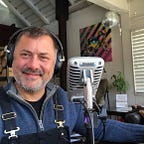Reconstructing My Father
It’s happening. Just like I thought it would.
Four days after my daughter was born, my father died. He actually stopped breathing on the day that had been my wife’s due date. In the four days between, my brother set up a Skype call so our dad could see his first and only grandchild. I don’t know what he felt. He wasn’t exactly able to speak. It seemed he was in so much pain and his mind so clouded by suffering. Mostly he seemed eager for the release that death would bring.
Five years later, my memories of him have unfolded as I’d hoped. It’s strange and counterintuitive, but memories are actually reconstituted every time we draw them up to our conscious experience. They’re not fixed and immutable.
If we remember the pain or anger, those memories are reinforced, and details around those feelings are strengthened. We forget how kindness or feelings of joy can flow within us to create a confusing and nuanced soup of emotions in the moment. Choosing which memories, happy or painful, we surface as a habit actually shifts our perceptions of past events.
My father was a difficult person and I’ve put a lot of time and thought into putting the hard parts to rest. I wrote about this here. I’ve met others who had unresolved conflict within them, around a parent no longer around; I’d seen them put these thoughts down and let them go by sharing them openly. I think this is a powerful tool for emotional healing, so I suppose that’s what I’m attempting here. We gain strength through vulnerability, solidarity with others, we bond through our shared pains. Ideally, we’d all be able to share our own darkness, without friends or family distancing themselves, and similarly be attentive and open when they offer to share the same.
In recent years I’ve been blown away by the power of focusing on the positive. This can be done without blindness to abuse or suffering. And even the most conflicted and harmful people have their moments when they shine, when their gifts lift up those around them. These may be tiny or brief, but I’ve never met a person who was pure sadism, nor have I met some kind of demi-god who was exclusively uplifting. We all contain ebbs and flows of subtle intentions and feelings. There are monsters and heroes in every person, and context can surface either.
When my father was gone, I chose to focus on those positives and capture them here.
Now when each Father’s Day arrives, my memories of him as a good man and committed dad grow with those passing years. The hurt and bitterness fade. I’ve been meaning for instance to write a post on having an “adventure mindset.” It’s a set of intentions that transcend our circumstances, intentions that go beyond any limitations of time or resources and help us to engage in each day with wonder, curiosity and awe.
My dad taught me that. He showed how being a single dad of three kids could involve road trips all over North America and Europe. He modeled an unfortunately rare quality in parents, a carpe diem attitude that begins in infancy and can continue undiminished through our years as parents, when many choose instead the common course of predictable routines, of sometimes going to sleep at the wheel.
Dad taught me to love books and play, the value of moving beyond my comfort zone. Though he may have been in some ways stuck and burdened, he transcended the circumstances of his birth, reached further and learned far more than if he’d done exactly what his mother had asked of him. Dad wanted to understand the terms of our human condition, a seeker’s mindset still with me now. His understandings were different from mine, but the way we both have sought answers is the same.
Today, my father’s remains are entombed in a crypt, strangely, in a Jewish cemetery north of Miami. He wasn’t a particularly observant Jew, more someone who showed at a Seder now and then for the sake of others. The water table at his grave is high. His bones I’m sure now are dry. One day, I expect, climate change will claim his remains for the sea.
The reality of him now is entirely of my choosing, so I choose to remember all of these gifts he gave to the world, no matter how troubled he may have also been.
